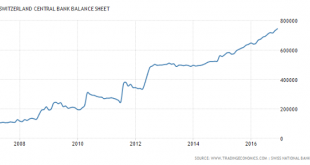The Economist refers to our work in the `Free Exchange’ section: But some argue banks would work fine if the public switched their deposits for central-bank digital currencies, so long as the central bank stepped in to replace the lost funding. “The issuance of [such currencies] would simply render the central bank’s implicit lender-of-last-resort guarantee explicit,” wrote Markus Brunnermeier and Dirk Niepelt in 2019. This scenario seems to have partly materialised since the failure...
Read More »Banking crisis: The new bailout strategy
Part I of II The recent turmoil that has roiled the global banking sector has placed central bankers in an impossible position: Cut rates and avert a domino-style disaster in the industry and a possible deep and prolonged recession in the wider economy or stay the hiking course to combat the still untamed inflationary pressures? Arguably the great losers in both cases will be the taxpayers and the average working household. The recent turmoil in the banking sector, both in the...
Read More »Banking crisis: The new bailout strategy
Part I of II The recent turmoil that has roiled the global banking sector has placed central bankers in an impossible position: Cut rates and avert a domino-style disaster in the industry and a possible deep and prolonged recession in the wider economy or stay the hiking course to combat the still untamed inflationary pressures? Arguably the great losers in both cases will be the taxpayers and the average working household. The recent turmoil in the...
Read More »“Reserves for All: Political Rather Than Macroeconomic Risks,” CEPR, 2021
Chapter 5 in the CEPR eBook, November 24, 2021. HTML. From the conclusion: From a macroeconomic perspective, central banks can largely neutralise the consequences of CBDC. What is highly uncertain, however, is whether they would choose to do so – the political risks of ‘Reserves for All’ are first-order. The decision for or against CBDC thus should not only reflect the assessment of economic trade-offs, but also whether societies are confident in their ability to efficiently manage...
Read More »Staat auf Corona-Diät setzen!
Seit dem 16. März verletzt der Bundesrat die Freiheitsrechte der Schweizer Bevölkerung in bisher in der Schweiz ungekannter Weise. Inspiriert von der Reaktion von Staaten ohne Tradition und Achtung individueller Freiheitsrechte, masste sich die Regierung an, fundamentale naturgegebene Freiheitsrechte der gesamten Schweizer Bevölkerung zu suspendieren. Im Zuge dessen setzte das Parlament zu der grössten Ausgabenschlacht der Nachkriegsgeschichte an, welche noch für mehrere Generationen höhere...
Read More »Price Effects of Purchases of Greek Sovereign Debt by the ECB
In a CEPR discussion paper, Christoph Trebesch and Jeromin Zettelmeyer argue that ECB bond buying had a large impact on the price of short and medium maturity bonds … However, the effects were limited to those sovereign bonds actually bought. We find little evidence for positive effects on market quality, or spillovers to close substitute bonds, CDS markets, or corporate bonds. A multiple equilibria view of the crisis would probably suggest otherwise.
Read More »In Unprecedented Intervention, Swiss Central Bank Bails Out Firm That Prints Swiss Banknotes
In the most ironic story of the day, the company that makes the paper that Swiss banknotes are printed on was just bailed out by the money-printing, stock-purchasing, plunge-protecting, savior-of-global equities…Swiss National Bank. - Click to enlarge While The SNB has a long and checkered history of buying shares in companies… as we have detailed numerous times, it is no stranger to pumping money into companies...
Read More »German Federal Constitutional Court vs. European Central Bank
In the FT, Claire Jones reports about the German Federal Constitutional Court’s decision to refer a case against the European Central Bank’s PSPP program to the European Court of Justice. “In the view of the [court] significant reasons indicate that the ECB decisions governing the asset purchase programme violate the prohibition of monetary financing and exceed the monetary policy mandate of the European Central Bank.” … While Germany’s constitutional court said the OMT programme was...
Read More »Monte dei Paschi Bail-X
The Economist reports about plans for Monte dei Paschi’s future: … retail investors in the bank’s junior bonds, many of them ordinary customers. European state-aid rules say that they should lose their money along with shareholders. Technically, they will. In fact, to preserve their savings and avoid a political outcry, they will be deemed to have been “mis-sold” the bonds: they will receive shares which will in turn be swapped for new, safer bonds. Italy has to come up with a...
Read More »The VIX Will Be Over 100 due to Central Bank Created Tail Risk
By EconMatters We discuss the manner in which Central Banks have destroyed financial markets, and have the stage for what I label as the Red Swan Event in this video. When the Swiss National Bank holds risky Tech stocks in its portfolio, we are in unchartered territory! We had the Financial Crisis of 2008, and instead of learning from the mistakes of incentivizing excessive risk taking, the Central Banks were allowed to...
Read More » Swiss Economicblogs.org
Swiss Economicblogs.org


